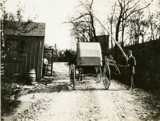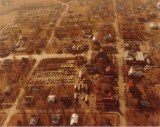
Burlington Toll Gate
 |
 |
Burlington, 1917 |
Burlington, from Caldwell Hill, c. 1950 |
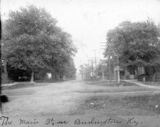 |
 |
| These two wonderful old Burlington photo's were sent to us by Dorothy Brown, who found them in the scrapbook of Rachael Rouse, her Mother. Thanks Dorothy! | |
 |
 |
 |
Looking West from the East side of Burlington |
Looking North on Burlington's Main Street, c. WWI | Looking North on Jefferson toward Torrid |
 |
 |
 |
Looking West in the |
Burlington, c. 1980 | Union Street at the |
 |
 |
 |
|
| Frank Milburn and his workshop.
If you're not familiar with Frank Milburn, buy all means read Matt Becher's piece about about this WWII hero and inventor him at this site (pdf). |
|||
Matt Becher's film about Frank Milburn. Matt's also published this piece on Milburn (pdf).
Frank Milburn's Workshop (pdf) is on the National Register of Historic Places.
 |
 |
| The T. B. Rouse Homestead on Conrad Lane, near Derby Farms |
Burlington, circa 1910 |
![]()
| Burlington was founded in 1799 as Craig's Camp, named for one of the owners of the land. The name was changed to Wilmington in 1800 and finally to Burlington, probably in 1816. We know Burlington was incorporated in 1824. A Boone Court House post office operated here from 1807 to 1820 but “Burlington” doesn't establish a PO until 1829. |
![]()
| “On the night of the 18th inst. fourteen slaves ran away from Burlington, Ky. They belonged to the following individuals: Ten to Ephraim Porter, two to J. G. Hamilton, one to Dr. J. F. Grubbs, and one to C. L. Stanford.” from the Louisville Journal, September 25, 1852. |
![]()
![]()
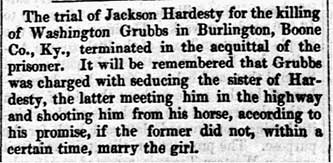
Pittsfield (MA) Sun, May 6, 1858
M. Gabriel hung - legally - in 1849. Story here. |
Louis Laferdette is described as “the tramp who attacked farmer William Whitlock of North Bend.” He was lynched for it. You can read the full story here. |
In 1941, the Boone County Recorder published 84-year-old Charles Fowler's recollections of a murder from 1866. It's a pdf you can read here. |
| The Lynching of Charles Dickerson, here. | Not all vigilantes lynched citizens. Sometimes they shot them. Like in this 1879 event | Revenge killings from Civil War incidents were a feature of post-war life in Northern Kentucky. An example. |
| Accounts of the lynching of Smith Williams, 1876, here, here, and here. | “A petition was presented by a member of the brethren residing in Burlington, Boone county, Kentucky, praying for the establishment of a new Lodge in that place: Whereupon, resolved, that a dispensation issue for a new Lodge to be held in Burlington; and that Abraham De Pew, be the master, John S. Perceival, the senior warden, and George Austin, junior warden.” Proceedings of the Grand [Masonic] Lodge of Kentucky, 1818 | |
| “If the law confining the sale of Cocoa Cola to those who are licensed to sell intoxicating drinks is passed by the Legislature it will deprive the local merchants of a source of considerable revenue. It is astonishing the quantity of Cocoa Cola that is consumed in Burlington” from the Boone County Recorder, February 7, 1918 | Meeting in Burlington, 1857 Boone Democrats recommend a solution to abolitionists, here. | |
Mad dog in Burlington. |
In 1878, The Boone County Recorder describes Burlington. Read it here. |
|
| James Tait remembers growing up in Burlington in 1822, here. | “There will be a Southern Rights meeting at Burlington, Boone County, on Monday next, September 2d. Hon. C. S. Morehead, Hon. J. W. Stevenson, and other distinguished speakers have been invited, and are expected to attend and address the meeting.” The Louisville Daily Journal, August 30, 1861 | |
| The 1837 establishment of the Covington and Burlington Turnpike Company. | The Kentucky State convention of the American broadly condemns the Ku Klux Klan. Boone Post #4 in Burlington says not so fast. Here. | |
| A Grant County writer describes Burlington in 1880.(“a dull sleepy town”) | ||
| Burlington is on the National Register of Historic Places. The original application is here, and a later application, which reduced the historic area, is here. Both are pdf's. Both have building histories, maps, pictures, and architectural details. | The 1836 Burlington sidewalk law. | |
| “John Campbell, living near
Burlington, Ky., raised this season, on eight acres and a fraction
of ground, 20,000 watermelons, 10,000 of which he shipped to
Cincinnati. The remaining are still in the patch.” New York Times, October 5, 1852 |
In 1898, the Enquirer advises cyclists on how, and why, to go to Burlington. | |
| A description of Burlington from the 1903 Courier-Journal, here, was followed the next day by a story of the rooster that caught the town on fire, here. | Troops sent to Burlington in the Civil War, here to defend against guerrillas. | |
“By order of Brigadier General Downey, of the Indiana Legion, a company of one hundred men, armed and equipped, with two wagons, under command of Lieu. Col. B. J. Spooner, and Capt. J. H. Farquor, 19th Infantry U. S. A., left here at 6 o'clock this evening for Burlington, Ky ., the county seat of Boone county, which place is to-night threatened by a band of guerrillas. They have orders to report to the Provost Marshal there. The company was raised in two hours and a half.” The Weekly Vincennes Western Sun, August 2, 1862. |
||
 Indianapolis News, June 22, 1881 |
Samuel Murray would like to announce that reports of his death are greatly exaggerated., 1854. | |
The trial of Peter Blimm, who was almost lynched in 1870, here. |
“F. Riddell has razed another one of the ancient landmarks in Burlington, the only original building in what one time was known as 'The Row.'” Boone County Recorder, October 10, 1879 | It's 1877, and the Irish are coming to burn Burlington!!! Well, not so much. Story here. |
 |
![]()
 |
 |
Judge George Gilpin Perkins |
This is a map of early Burlington buildings. The key to the places on the map is here. |
 |
 |
 |
| Dr. W. O. Rouse Home, 1903 | Attorney S Gaines Home, 1903 | J. C. Revill's Home, 1903 |
![]()
These Burlington area houses are on the National Register of Historic Places. The applications contains photo's, maps, history, and architectural details. All are pdf's. |
||||
| Botts House | Huey House | Ephraim Uitz House | Jonas Clore Cabin | |
| Robert Chambers House | Thomas Zane Roberts House | McKim House | Delph House | |
| Benjamin Gaines Farm | ||||
 |
|
| James G. Smith House | Courtney Kelly Home |
| Both are drawings by Caroline Williams | |
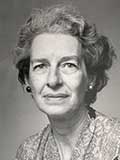 |
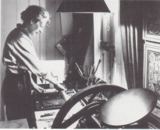 |
 |
 |
You've likely seen many of the drawings
done by Caroline Williams, a staff
artist for the Cincinnati Enquirer for many years. She lived near
Burlington,
and made prints of her work on her own press.
NKY Views has reproduced some of her sketches from the
Airport,
Petersburg Christian,
Florence Methodist, and Sorghum Making on East Bend Road.
A 1939 interview with Ms. Williams, a 1938 feature article on her, and her 1988 obituary.
 |
 |
| Burlington Baseball Team | Burlington Basketball Team, 1930-1931 |
![]()
The famous madstone: Burlington was once the location of a famous madstone. What's a madstone? If you don't know, by all means brush up on this fascinating but arcane piece of folklore at this site. Instances from Burlington are here. |
![]()
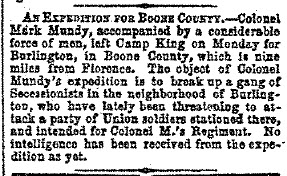
Cincinnati Daily Enquirer, November 6, 1861
Camp King was in Covington
| “Burlington, the county seat of Boone, is six miles from a railroad, but the public spirit of the people is being aroused, and a branch connecting the town with Erlanger, a station on the Cincinnati Southern, will probably be built.” Courier Journal, December 17, 1887 | “Died – Near Burlington, Boone county, Kentucky, on the 22nd April, John Shaver, aged one hundred and sixteen years and seven days. We presume Mr. Shaver was, at this death, the oldest person in America.” From the Louisville Daily Courier, May 3, 1851 |
| “Louisville. - The largest pool of wool ever sold
in Kentucky was that disposed of by Boone county growers at
Burlington, Ky., when 400,000 pounds was purchased by D. Davis & Son
and Isaac Rosenbaum & Sons, of this city. The price paid for
the best grades was 26 3/4 cents. The wool is said to be the
choicest in the state. According to the local purchasers the
total price is near $90,000.” from the Berea Citizen, August 11, 1910 |
“In a copy of the Recorder
dated July 19, 1877, we find the following items: 'Nine pianos, four
organs, and one melodeon make up the list of musical instruments in
Burlington.' There are now about 20 pianos, several more organs, and
no melodeon. The organ referred to is now used in the
Methodist church.” The Boone County Recorder, February 3, 1904. |
| We know that there were at least two newspapers in Burlington pre-Civil War: The Burlington Advertiser (1850), and the Locomotive (1856). The dates represent issues that have been found, or referenced, not a start or stop date. | |
| “Was there ever a legal hanging in this county, and if so, at what time and who was the criminal judge? (Yes, several. Gabe, a colored man was hung in 1849 - James Pryor was Judge. Joe, a colored boy was hung before the war, Elijah Nutall, Judge. There have been several others. - Ed.)” The Boone County Recorder, February 17, 1904 | “The extreme penalty of the law was inflicted upon the negro boy Joe in Boone county, on Friday of last week. Some three or four thousand persons were present. There was no disturbance of any kind. Joe, on being conducted to the place of execution, simply remarked that he was 'glad they were not going to burn me.'” from Vevay, Indiana's Indiana Reveille, March 31, 1858, citing the Covington (Ky) Journal as the original source of the item. |
The circus comes to Burlington, 1858.
![]()
